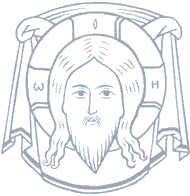 |

|
||||||||||||||||
Ты Бог мой! Музыкальное наследие священномученика митрополита Серафима Чичагова
[Автор-составитель: О. И. Павлова; Автор-составитель: В. А. Левушкин]
07 сен. 2016 г. Физическое и духовное здоровье: по "Медицинским беседам" Леонида Михайловича Чичагова
[сщмч. Серафим (Чичагов)]
10 мая. 2016 г. |
Фокин А. Р. Учение Мария Викторина о душе и ее месте в иерархии сущего // Богословский вестник: Номер 26-27УДК 128 (211) Аннотация Статья посвящена исследованию учения Мария Викторина (ок. 281/291–382) о душе, ее природе, происхождении и месте в иерархии сущего по его теологическим трактатам о Троице в широком историко-философском контексте. Вначале проводится краткий анализ результатов основных зарубежных исследований по данной теме. Далее автор, основываясь на трактате «О рождении Божественного Слова», проводит реконструкцию психологической доктрины Викторина, согласно которой души занимают среднее, промежуточное положение в иерархии бытия. При этом такое положение является не статичным, а динамичным. Помимо индивидуальных душ, Викторин признает существование мировой, или всеобщей, души. В вопросе о происхождении души Викторин стремится согласовать библейское представление о сотворении души человека Богом с платоновским учением о предсуществовании душ. Показывается, что, согласно Викторину, душа представляет собойнезависимую сущность, или субстанцию, поскольку она обладает самостоятельным и независимым существованием и может становиться подлежащим («субъектом») Божественного Ума и Духа. Природа души определяется тремя важнейшими характеристиками: мышлением, самодвижением и бестелесностью. В каждой душе от вечности запечатлены образы вечных Божественных идей; для того чтобы душа их осознала, необходимо ее просвещение Божественным Логосом. Душе свойственны два вида мышления: чистое интеллектуальное мышление; и мышление посредством чувства. Душа даже в состоянии соединения с телом сохраняет возможность вернуться к Богу и непосредственно познавать Бога. Отмечается, что характерной чертой учения Викторина о душе является преобладание в нем платонических и философских элементов над элементами христианскими и богословскими, вследствие чего его учение представляется внутренне противоречивым и несогласованным. Ключевые слова: античная философия, неоплатонизм, раннее христианство, Марий Викторин, Плотин, Порфирий, теология, онтология, психология, душа, тело, разум, интеллект, познание, творение. ИЗДАНИЯ И ПЕРЕВОДЫ Фокин 2011 — Марий Викторин.Против Ария. Кн. 3. Гл. 4–9 / Пер. с лат. и комментарии. А. Р. Фокина // Философия религии: Альманах. 2011. № 3. C. 286-297. [Marii Viktorin. Protiv Ariia. Kniga 3. Glavy 4–9 (Against Aria. Book 3. Chast' 4-9) / Perevod s latinskogo i kommentarii. A. R. Fokina // Filosofiia religii: Al'manakh (Philosophy of religion: Almanac). 2011. № 3. P. 286-297.] Фокин 2017a — Марий Викторин. «О рождении Божественного Слова», «Против Ария», «Гимны о Троице» (фрагменты) // Святые Отцы и учители Церкви. Антология. Т. 2. Золотой век святоотеческой письменности (начало IV – начало V вв.) / Пер. с лат. А. Р. Фокина, под общей ред. митр. Волоколамского Илариона (Алфеева). М., 2017. С. 514–532. [Marii Viktorin. «O rozhdenii Bozhestvennogo Slova», «Protiv Ariia», «Gimny o Troitse» (fragmenty) (“On the Birth of the Divine Word”, “Against Aria”, “Hymns of the Trinity” (fragments)) (“On the Birth of the Divine Word”, “Against Aria”, “Hymns of the Trinity” (fragments)) // Sviatye Ottsy i uchiteli Tserkvi. Antologiia. Tom 2. Zolotoi vek sviatootecheskoi pis'mennosti (nachalo IV – nachalo V vekov) (Holy Fathers and teachers of the Church. Anthology. Tom 2. The Golden Age of the patristic writing (beginning of the IVth – beginning of the 5th centuries)) / Pererevod s latinskogo A. R. Fokina, pod obshchei redaktsiei mitropolit Volokolamskogo Ilariona (Alfeeva). Moscow, 2017. P. 514–532.] Фокин 2017b — МарийВикторин. О рождении Божественного Слова / Пер. с лат. А. Р. Фокина // БТ. 2017. Вып. 47–48. С. 481–525. [Marii Viktorin. O rozhdenii Bozhestvennogo Slova (On the birth of the Divine Word) / Perevod s latinskogo A. R. Fokina // Bogoslovskie trudy (Theological works). 2017. Vypusk 47–48. P. 481–525.] Gori 1986 — Mar ii Victorini Opera. Pars II. Commentarii in Epistulas Pauli ad Ephesios, ad Galatas, ad Philippenses / Ed. F. Gori. Vindobonae, 1986 (CSEL 83.2).
Henry, Hadot 1960 — Marius Victorinus. Traités théologiques sur la Trinité / Ed. P. Henry, P. Hadot. P., 1960 (SC 68, 69).
Henry, Hadot 1971 — Marii Victorini Opera. Pars I. Opera theological / Ed. P. Henry, P. Hadot. Vindobonae, 1971 (CSEL 83.1). Locher 1972 — Marius Victorinus. Commentarii in Apostolum / Ed. A. Locher. Leipzig, 1972. Marius Victorinus 1981 — Marius Victorinus. Theological Treatises on the Trinity. Wash. , 1981. (Fathers of the Church 69). ЦитируемыесочиненияМарияВикторина Adversus Arium — Henry, Hadot 1971. P. 54–277. Commentarii in Epistulas Pauli ad Ephesios — Gori 1986. P. 1–94. De generatione Divini Verbi — Henry, Hadot 1971. P. 15–48. Hymni de Trinitate —Henry, Hadot 1971. P. 285–305. ЛИТЕРАТУРА Фокин 2007 —Фокин А. Р. Христианский платонизм Мария Викторина. М., 2007. [Fokin A. R. Khristianskii platonizm Mariia Viktorina (Christian Platonism of Marius Victorinus). Moscow, 2007.] Фокин 2014 — Фокин А. Р. Формирование тринитарной доктрины в латинской патристике. М., 2014. [Fokin A. R. Formirovanie trinitarnoi doktriny v latinskoi patristike (Formation of Trinitarian Doctrine in Latin Patricistics). Moscow, 2014.] Фокин 2016 — Фокин А. Р. Модусы сущего и не сущего у Мария Викторина // Платоновские Исследования IV/1 (2016). М. — СПб., 2016. С. 130–169. [Fokin A. R. Modusy sushchego i ne sushchego u Mariia Viktorina (Modes of existence and not existence in Marius Victorinus) // Platonovskie Issledovaniia IV/1 (2016) (Platonic Research IV / 1 (2016)). Moscow — Saint Peterburg, 2016. P. 130–169.] Benz 1932 — Benz E. Marius Victorinus und die Entwicklung des abendländischen Willenmetaphysik. Stuttgart, 1932. Clark 1974 — Clark M. T. The Psychology of Marius Victorinus // Augustinian Studies. 1974. Vol. 5. P. 149–166. Geiger 1888 — Geiger G. Marius Victorinus Afer, ein neuplatonischer Philosoph. Lansdhut, 1888. Hadot 1962 — Hadot P. L’image de la Trinité dans l’âme chez Victorinus et chez saint Augustin // StP. 1962. Vol. 6. P. 409–442. Hadot 1968 — Hadot P. Porphyre et Victorinus. P., 1968. Vol. 1. Hadot 1971 — Hadot P. Marius Victorinus. Recherches sur sa vie et ses oeuvres. P., 1971. Koffmane 1880 — Koffmane G. De Mario Victorino, philosopho christiano. Breslau, 1880. Leusse de 1939 —Leusse de H. Le probleme de la préexistence des âmes chez Marius Victorinus // Recherches de science religieuse. 1939. T. 29/2. P. 197–239. Nautin 1964 — Nautin P. Candidus l’Arien // L’homme devant Dieu: Mélanges offerts au père Henri de Lubac. T. 1. Exégèse et patristique. P., 1964. P. 309–320. Séjourné 1950 — Séjourné P. Victorinus Afer // Dictionnaire de théologie catholique. P., 1950. T. 15/2. Col. 2887–2954. Simonetti 1963 — Simonetti M. Nota sull’Ariano Candido // Orpheus. 1963. Vol. 10/2. P. 151–157. Simonetti 2006 — Simonetti M. Candido Ariano // Nuovo dizionario patristico e di antichità cristiane. Vol. 1 / Diretto da A. Di Berardino. Genova — Milano, 2006. P. 842. Stefani 1987 — Stefani M. Sull’ antropologia di Mario Vittorino (La «discesa» vivificante dell’ anima in prospettiva cosmologica) // Scripta Theologica. 1987. Vol. 19. P. 63–112. Steinmann 1990 — Steinmann W.Die Seelenmetaphysik des Marius Victorinus. Hamburg, 1990.
Abstract Fokin A. K.Marius Victorinus’ teaching on the soul and its place in the hierarchy of beings This article deals with Marius Victorinus’ (ca. 281/291–382) teaching on the soul, its nature, origin and place in the hierarchy of beings represented in his theological treatises on the Trinity. The A. proposes an original reconstruction of the psychological doctrine of Victorinus, according to whom the souls occupy a middle, or intermediate position in the hierarchy of beings. At the same time their position is not static, but dynamic. There is also a world-soul, or universal soul, which penetrates all parts of the world and becomes the source of individual souls. Regarding the question on the origin of souls, Victorinus seeks to reconcile the biblical and Platonic doctrines. The author shows that, according to Victorinus, the soul is an independent entity or substance, since it has an independent existence and becomes a subject of the Divine Intellect and Spirit. The nature of the soul is determined by three main features: intellection, self-movement and incorporeality, which coincide with the very substance of the soul. Every human soul from eternity possesses the images of eternal Divine ideas; in order to grasp them, the soul has to receive enlightenment from the Divine Logos. Two types of thinking are inherent to the soul: first, simple and pure intellectual thinking directed to the intelligible beings and the soul itself; secondly, a thinking through senses which is an imitation of true thinking. The soul, even in a state of its union with a body, possesses an opportunity to return to God and to contemplate him directly. The characteristic feature of Victorinus’ teaching on the soul is the predominance of platonic and philosophical elements over Christian and theological ones, so that his teaching seems internally contradictory and inconsistent. Keywords: ancient philosophy, Neoplatonism, early Christianity, Marius Victorinus, Plotinus, Porphyrius, theology, ontology, psychology, soul, body, intellect, knowledge, movement, creation. |
|||||||||||||||||||||||||||||||||||||
